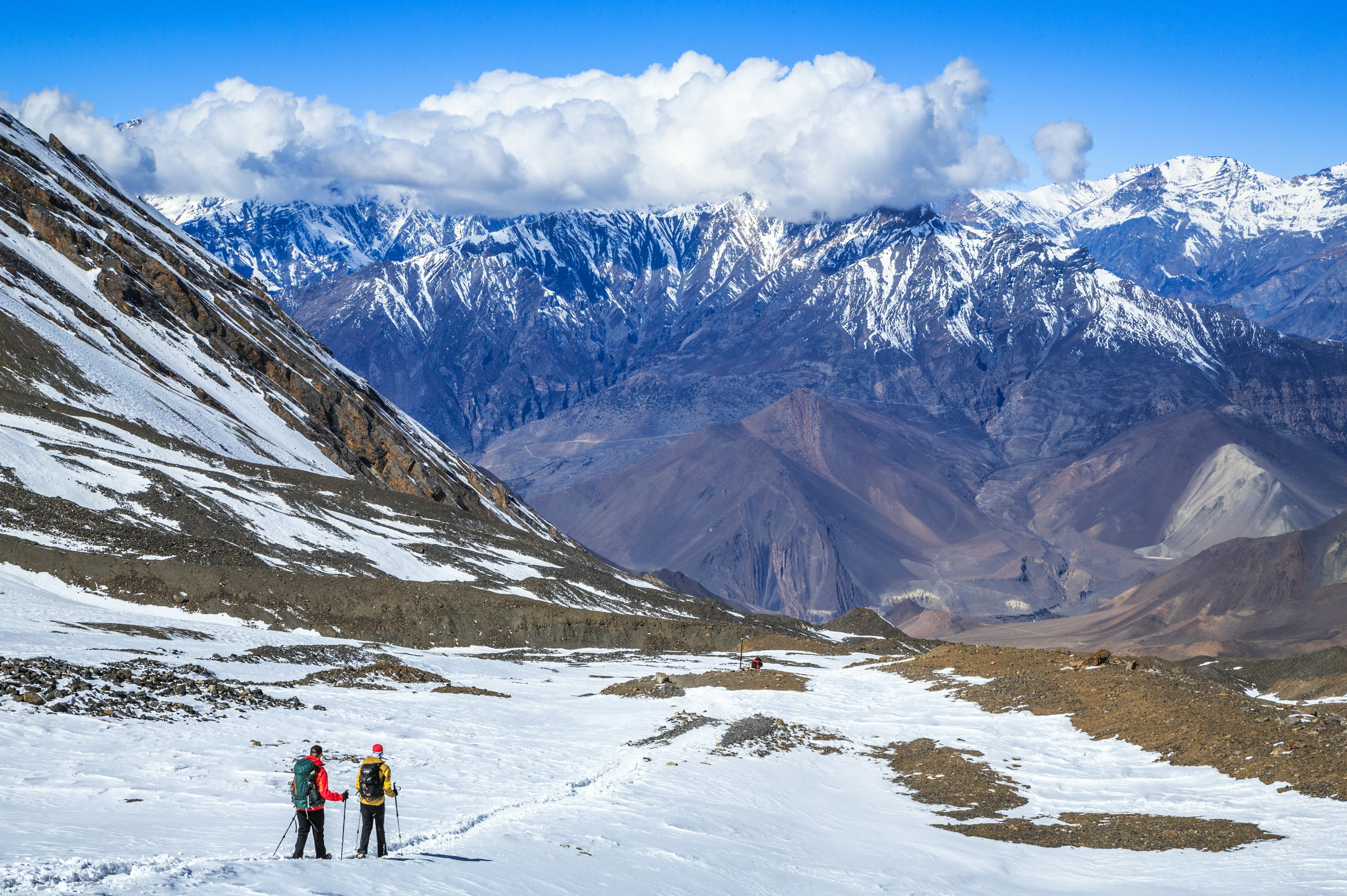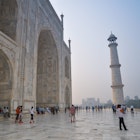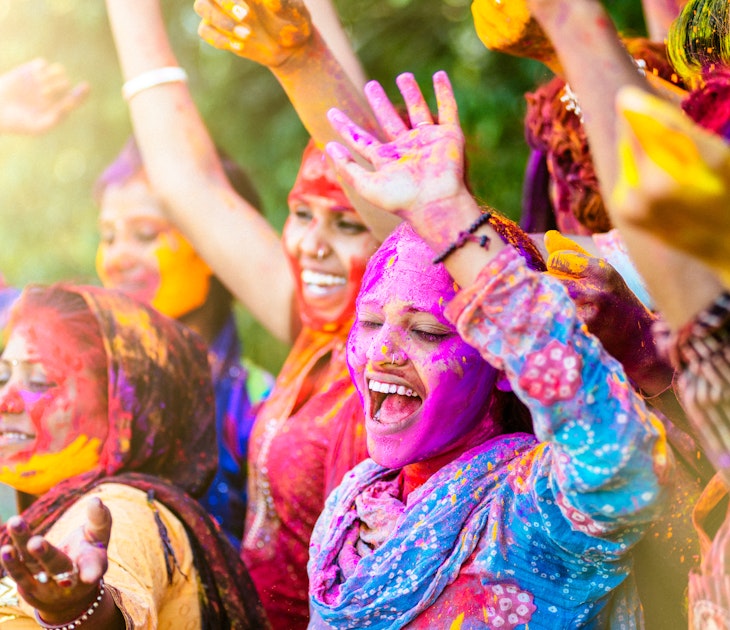

Spring and fall are the peak times for trekking, but the Kathmandu Valley can be explored at any time of year © NurPhoto / Getty Images
While Nepal may be most famous for its high-altitude mountains, it actually spans from the lowland Terai – the jungle-filled plains bordering India – to the edge of the high-altitude Tibetan Plateau. There’s a lot of climatic variety.
The best month to visit Nepal largely depends on what you want to do while you’re there, and whether you’ll be visiting either very high or very low-lying places. The weather plays a big part in the tourism seasons.
Whether you want to spot rhinos, go white-water rafting or hike in the mountains, our insider guide to Nepal's seasonal variations and festivities will help you choose the best possible time for your trip.

Late September to November is the best time for trekking, sightseeing and festivities
October to November is the peak season for travel to Nepal and these are the best months to visit for most activities (late September is the shoulder season, although monsoon rains can linger). The weather is warm but not too hot, and the generally clear skies mean great mountain views. Rafting or kayaking on Nepali rivers is also fun, with decent water volume and good temperatures. It’s not the cheapest time to visit Nepal, but the country is generally affordable anyway.
Potential visitors are often wary of traveling during peak season because of the crowds but it really depends where you go. On a famous trekking trail, like Everest Base Camp, you won’t have the trails to yourself. Not by a long shot. Guides, flights, and accommodation should be booked as far in advance as possible, potentially a few months.
But those pictures you’ve seen of human traffic jams on Everest? They’re only a concern if you want to climb the mountain, not trek to it. And overcrowding only really applies to Everest, not the rest of the country. The vast majority of travelers don’t want to climb Everest, but if you do, the peak mountaineering season is different from the peak tourism season (see below). To take advantage of the great weather in peak season without the crowds, consider less well-known trekking routes. They’ll be less busy and accommodation will be more available.
Peak tourism season also coincides with peak festival season. Dashain (also called Dashami or Durga Puja) usually falls in October, while Tihar (also called Deepawali, or Diwali in India) is usually in November. The dates vary because they follow a lunar calendar. Dashain is mostly a family affair, and Kathmandu essentially clears out for around a week during the festival, with many shops and businesses closed. Tihar, the festival of light, is more accessible to travelers – it follows a couple of weeks after the end of Dashain. You’ll see displays of lights and rangoli decorations outside homes and businesses all over the country. It’s one of the best times to visit Kathmandu or Pokhara.
Get inspired with some of our favorite treks in Nepal.

Winter is the best time for off-season low-altitude trekking
Much of Nepal sits at a lower altitude than many people think, and the short winter (December to early February) is typically mild at lower altitudes, including the capital. There may be some foggy mornings and chilly nights, but when the sky is clear, winter days can be quite warm in the cities.
Other major advantages of visiting in the winter is that it’s one of the cheapest times to visit Nepal and there are few other tourists around. Lower-altitude trekking trails –anything that stays below circa 2500m (8200ft) – will be comfortable, as long as you have a good jacket for cold nights. Experienced winter hikers could even venture higher, but you’ll need to be well kitted out and prepared for snow.
Late winter is the best time for wildlife spotting
Nepal isn’t only about the mountains. The national parks on the Terai, such as Chitwan and Bardia, are full of wildlife, including lots of one-horned rhinoceros and a few Royal Bengal tigers. The best time to spot wildlife is at the end of winter (January and February). In late January, local villagers are allowed to cut the high elephant grass that shoots up after the monsoon (which ends in September), and the animals that were previously hiding in it become visible. You’re much more likely to spot rhinos and other animals at this time of year. Plus, wait any later and the temperatures on the Terai become blisteringly hot.

Spring is the second peak season but proceed with caution
For years, spring (late February to April) was touted as a second peak season in Nepal. However, in recent years, this common wisdom rings less and less true. Winters are usually dry, and as temperatures heat up through the spring, wildfires spread.
This has been happening for a long time but, with climate change, wildfires have become significantly worse over the last few years. The smoke from wildfires impacts air quality throughout the country – it's already hazardous in Kathmandu – and that includes the visibility of mountains.
An attractive feature of spring, however, is all the festivals. Shivaratri in February, Holi in March, and Patan’s Rato Machhendranath festival in April are all accessible to travelers and great fun.
Avoid the pre-monsoon and monsoon seasons aka the worst times to visit Nepal
By late spring, Nepal is counting down to the arrival of the monsoon. Temperatures become uncomfortably hot in many places and the air quality is poor. The stifling conditions ease somewhat with the arrival of the monsoon in June, and locals welcome the cooling, refreshing rains.
However, for travelers, the monsoon is the worst time to visit Nepal. Rain means cloudy skies, muddy and flooded streets, canceled or delayed flights, and the potential for landslides across roads. There may be pockets of beauty in Nepal’s monsoon, but visitors should give this season a wide berth. The rains generally peter out by mid-September.

Spring and fall are best for mountain climbing
Much of the above advice doesn’t really apply if you want to climb Mt Everest or another Himalayan peak, as the climbing seasons don’t always align with the best trekking and sightseeing seasons. Spring (March to May) and early autumn (late September and October) are the best times for mountaineering, as temperatures and weather conditions are optimum. However, conditions vary year by year, and climbing expeditions are sometimes affected by unpredictable conditions in the mountains.
Keep planning your trip to Nepal:
Pick your must-visit locations with our guide to the best places to visit
Insider tips and tricks if you're visiting Nepal on a tight budget
Forge your own path and explore Nepal on a road trip
Explore related stories









 Budget TravelIndia on a budget: 14 ways to get the best experience for less
Budget TravelIndia on a budget: 14 ways to get the best experience for lessSep 10, 2024 • 10 min read

